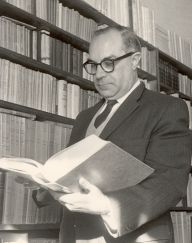Rafael Lapesa facts for kids
Quick facts for kids
Rafael Lapesa
|
|
|---|---|
 |
|
| Born | Rafael Lapesa Melgar 8 February 1908 Valencia, Spain |
| Died | 1 February 2001 (aged 92) Madrid, Spain |
| Occupation | Philologist |
| Language | Spanish |
| Notable awards | Prince of Asturias Award for Literature 1986 |
| Seat k of the Real Academia Española | |
| In office 21 March 1954 – 1 February 2001 |
|
| Preceded by | Ángel González Palencia |
| Succeeded by | José Antonio Pascual |
| Director of the Real Academia Española (interim) | |
| In office 14 January 1988 – 1 December 1988 |
|
| Preceded by | Pedro Laín Entralgo |
| Succeeded by | Manuel Alvar |
Rafael Lapesa Melgar (born 1908, died 2001) was a Spanish expert in languages and literature. He studied the history of the Spanish language and its literature. He was known as a philologist, which means someone who studies language in written historical sources.
Contents
Early Life and Education
Rafael Lapesa was born in Valencia, Spain, on February 8, 1908. When he was eight years old, his family moved to Madrid.
By 1930, he became a professor. He earned this title for his studies on an old dialect from western Asturias.
A Career in Language and Teaching
Rafael Lapesa worked at the Centro de Estudios Históricos. Here, he learned from famous experts like Ramón Menéndez Pidal, Tomás Navarro Tomás, and Américo Castro.
In 1932, he married Pilar Lago de Couceiro. They met while they were both students.
From 1932 to 1941, he was a professor of Spanish Language and Literature in Madrid. During the Spanish Civil War, he even taught soldiers how to read and write.
Later, he taught at other universities:
He returned to Madrid in 1947. At the Complutense University of Madrid, he became a professor. He taught the history of the Spanish language until 1978.
Work with the Royal Spanish Academy
In 1947, Rafael Lapesa joined the Seminario de Lexicografía. This group is part of the Real Academia Española, which is like the official authority for the Spanish language. He became its director from 1969 to 1981.
He helped create the Diccionario histórico de la lengua española (Historical Dictionary of the Spanish Language). He traveled a lot, teaching as a visiting professor at many universities. These universities were in Europe, North America, and South America.
He also received many important awards for his work. These included the French Légion d'honneur and the Prince of Asturias Award for Literature.
Notable Works
Rafael Lapesa wrote many important books about the Spanish language and its history:
- Historia de la lengua española (History of the Spanish Language) (1942)
- Historia lingűística y historia general (Linguistic History and General History) (1958)
- Sobre el texto y lenguaje de algunas "jarchyas" mozárabes (On the Text and Language of Some Mozarabic "Jarchyas") (1960)
- Le dictionnaire historique de la langue espagnole (The Historical Dictionary of the Spanish Language) (1960)
- El andaluz y el español de América (Andalusian and American Spanish) (1964)
- De la Edad Media a nuestros días (From the Middle Ages to Our Days) (1967)
- Generaciones y Semblanzas de filólogos españoles (Generations and Portraits of Spanish Philologists) (1998)
- En el centario del nacimiento de don Miguel Asín (On the Centenary of the Birth of Don Miguel Asín) (1969) - with Emilio García Gómez
- Léxico hispánico primativo: siglos VII-XII (Primitive Hispanic Lexicon: 7th-12th Centuries) (2003) - with Constantino García
See also
 In Spanish: Rafael Lapesa para niños
In Spanish: Rafael Lapesa para niños
 | Sharif Bey |
 | Hale Woodruff |
 | Richmond Barthé |
 | Purvis Young |

